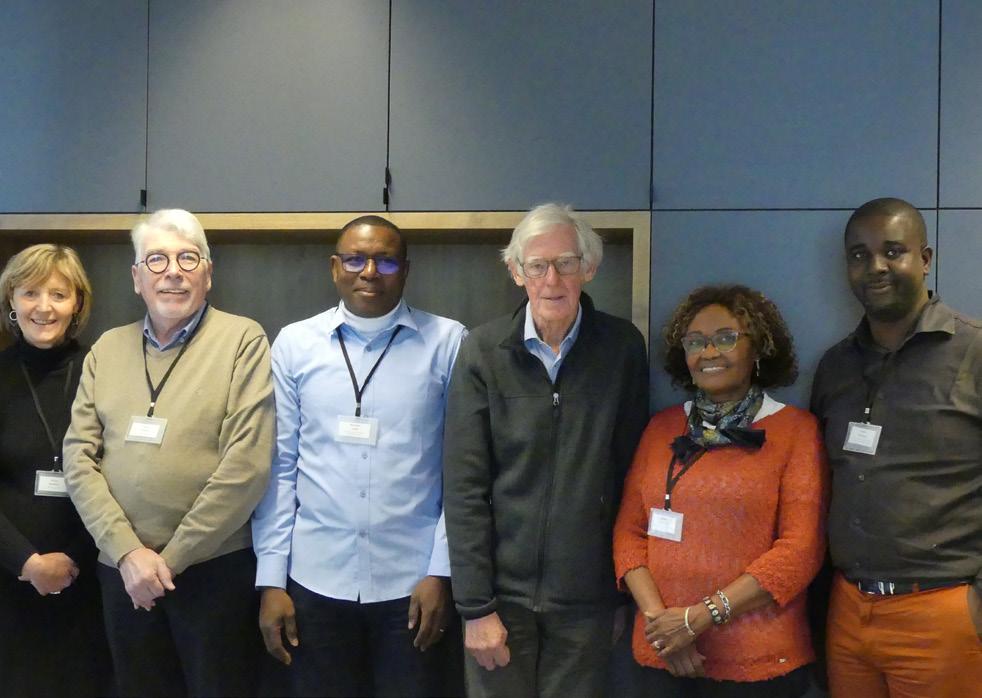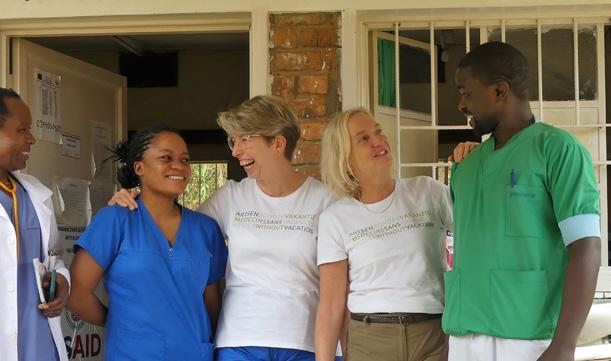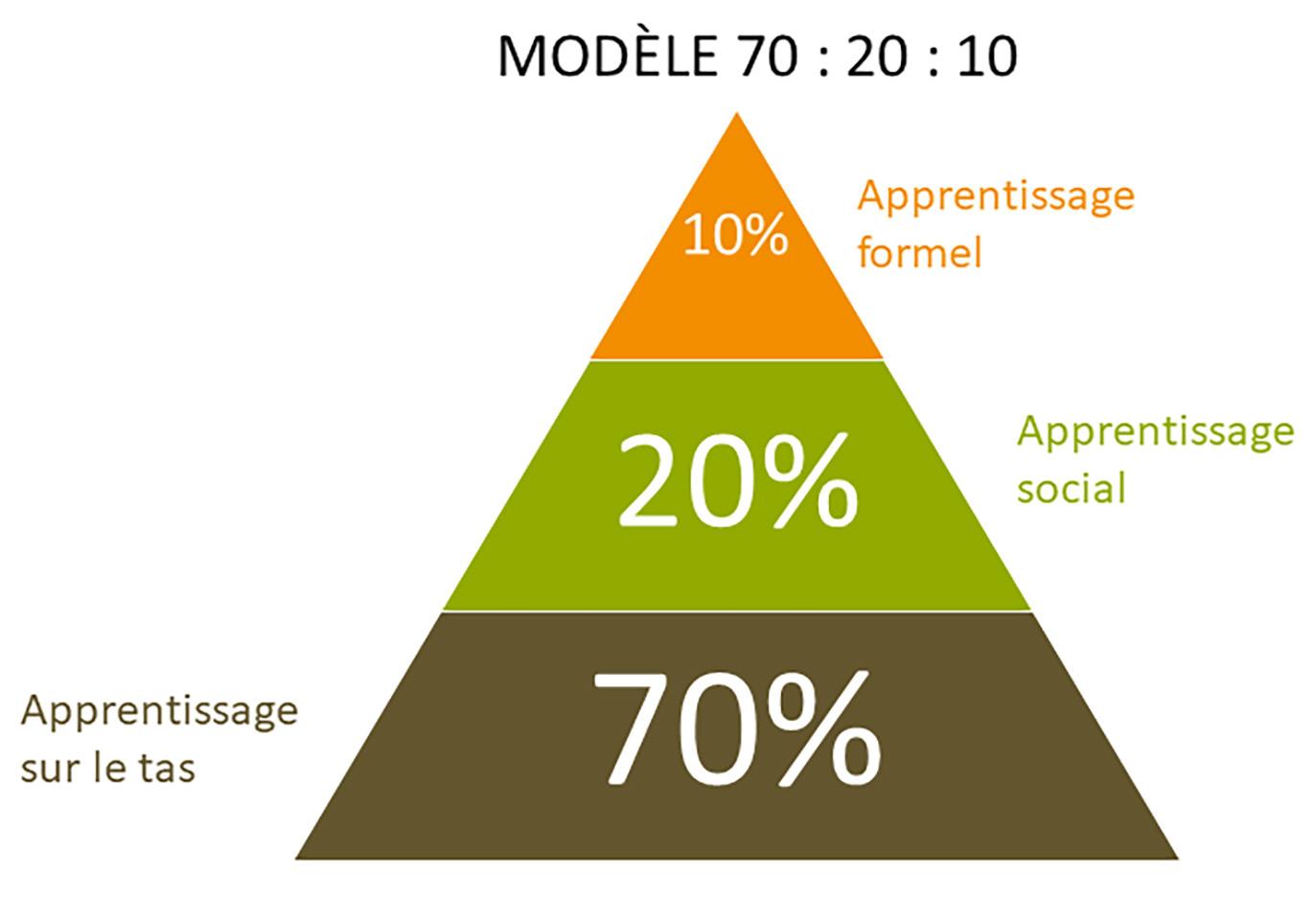
4 minute read
EXPERTISE AN INTERNATIONAL NETWORK OF HEALTH PROFESSIONALS
Medics Without Vacation’s network of health professionals consists of more than 500 expert-volunteers organised in different working groups.

Advertisement
Expert-volunteers: 68
16 Physiotherapists
29
Working groups
In order to structure, but also to facilitate the work of our network, the expert-volunteers gather in work groups. These working groups are organised according to specialities: pediatrics, surgery, anesthesia, gynaecology-obstetrics, internal medicine, emergencies & intensive care, pharmacy, hospital hygiene, physiotherapy, medical imaging, laboratory/lab, mental health, public health & hospital management, infrastructure & equipment. Furthermore than their expertise, one of the strengths of Medics Without Vacation lies within these groups: a community of experts who work together around a specific theme, with an explicit objective in order to present an efficient result that can be shared with their colleagues. The aim is to:
• Improve the quality of in situ training missions through sharing (para)medical, technical and organisational knowledge
• Develop, spread and support the implementation of protocols, guidelines/standards and modules
4 Roles In The Expertise
Our experts make a major contribution to the cooperation with Medics Without Vacation’s partner hospitals. These hospitals are empowered so that they can fulfil their role in the health system, provide quality care and prepare, react and adapt adequately in the event of a crisis.
To this end, the expert-volunteers of the Medics Without Vacation network operate on 4 levels:
Roles For Health Professionals Within The Mwv Network
Coaching
• Training (on the job or workshops)
• Online courses and coaching
• Train the trainers
• Monitoring and supervision
Mobilising
• Testimonials
• Communication
• Fundraising
• Awareness raising
Coaching
The specificity of Medics without Vacation is to carry out in situ training courses which are based on the 70-20-10 learning model. The staff learn 70% «on the job» (by practicing), 20% through personal follow-up or social learning (conversations, networking, feedback) and 10% through formal knowledge transfer.

Practical training
Adapting
• Working groups
• Improving methodologies and innovations
• Harmonisation, standardisation
• Documentation and evaluation of experiences
Connecting
• Expanding the network
• Mentorship
• Conferences/publications
• Lobbying and partnerships
A characteristic of Medics Without Vacation’s approach is that it focuses on the needs of the learner by organising training at the work place. This has the advantage of not detaching the health staff from their workplace, of reaching the whole team of the service at the same time and not just a few individuals, of training the learners in their own environment with their often-limited means, and of providing them with the opportunity to participate in the training. It will bring specialist medicine closer to the peripheral population, increase the possibilities of exchange between learners, as well as organisational and financial benefits.
Learning through interpersonal relationships and peer-to-peer exchanges.
Links are formed between hospital staff and experts during their stay in the field. The side-by-side cooperation between the trainer and the learner facilitates the establishment of trust and communication channels.
Medics Without Vacation provides its network with tools to maintain links between participants beyond the training courses. The aim is to create a community of professionals who interact with each other independently. The benefits of the training courses last because they are reinforced with each exchange. New skills are also transmitted through this network. Indeed, the educational activities implemented are built around a permanent mentoring, based on an interpersonal relationship, also during formative supervision and post-training follow-up.
We also organise courses and training in specialised centers (training hospitals), which completes the range of possibilities offered and strengthens the creation of links between health professionals.
Adapting
Our experts also play an important role outside the field by responding to various requests from hospitals. Based on their expertise and experience, they proactively propose improvements in a demand-driven way.
learning on the job
Model: 70 : 20 : 10 formal learning social learning
Based on this 70-20-10 model, Medics Without Vacation mainly engages with its network of expert-volunteers by organising on-the-job training in targeted hospitals during multidisciplinary working visits.
Training courses that aim to empower the capacity of hospital professionals are defined after a thorough analysis of each hospital, based on national standards, the technical, medical and support services of a 1st referral hospital, patient flow and existing staff skills.
For each in situ training, a multidisciplinary team of experts is sent to a 1st referral hospital for a limited period of time, but sufficiently and reasonably enough to cover the training needs, during which they work with the entire whole team of the hospital’s department. The principle is to bring together the expert-volunteers and the hospital team around concrete cases. Exchanging, working together to care for patients, to respond to real problems and to exchange on practices (bedside teaching).
This permanent support includes many forms of joint reflection within the work groups:
• Finding solutions to hospital-specific problems
• Proposing innovations or improvements based on findings in the field
• Development of strategies in their specific health areas.
• Harmonisation of protocols, development of training packages and advocacy for health-related issues.
Connecting
The strength of Medics Without Vacation lies within its network of expert-volunteers and the exchanges that take place inside it. In recent years Medics Without Vacation has been trying to capitalise on this asset, the network, in order to duplicate it in the countries where we are active. The aim is to have communities of experts in each country forming a transnational network. The different experts of different nationalities work together on the same activities, each bringing to the other -experts and learners - their knowledge, experience and expertise.
One way to develop these national communities of experts is through collaboration with existing learned societies. These learned societies (surgical society, pediatric society, etc.) organise together with Medics Without Vacation the sharing of medico-technical practices and approaches in their specialty.
For the development of the community of expert-volunteers, Medics Without Vacation also aims to activate the most experienced experts to act as mentors for new experts joining the organisation’s network.


